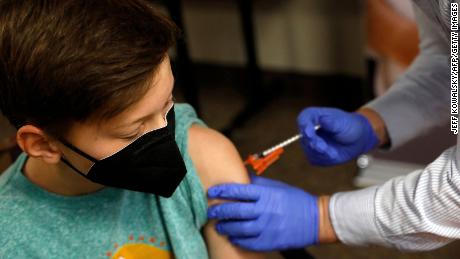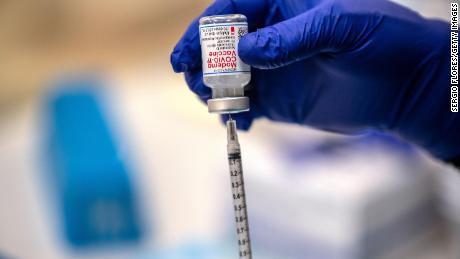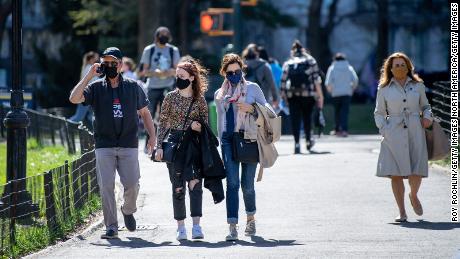Tatelman had recently received her second dose of Pfizer’s Covid-19 vaccine, and the end of the pandemic was finally in sight. Maybe soon she could play with her grandchildren and return to her volunteer work helping children in foster care. Maybe in a few months, when her husband turned 75, they could go out to a restaurant to celebrate.
As she walked, she ran into her family physician — who killed her buzz very quickly.
To treat inflamed blood vessels in her lungs, Tatelman, 73, takes a drug that suppresses her immune system. Her doctor had been reading recent medical studies suggesting the vaccine might not work well for some people taking medications like hers.
He asked her to get a blood test to see if the vaccine had worked — if she had antibodies against the virus.
She did the test and had no detectable antibodies against Covid-19.
“It was a total shock,” she said.
Tatelman was now full of questions for her doctor. Did her low antibody levels mean the vaccine didn’t work? Should she get a third dose of the vaccine? Should she cut back on the drugs that suppress her immune system to give the vaccine a better chance of working? Was there anything else she could try to make a Covid-19 vaccine work for her?
There’s very little data to help Tatelman and her physician answer these questions. Tens of millions of other Americans are also taking immunosuppressive drugs that might weaken the effect of the Covid-19 vaccine, and they find themselves in uncharted territory, scared — with good reason — that their vaccinations might not have worked.
If their vaccinations did not work, they rely on the rest of the population to get vaccinated.
This should inspire people who have not been vaccinated to roll up their sleeves, National Institutes of Health Director Dr. Francis Collins told CNN Thursday.
“Even if you think you don’t need to, think about this as a donation of your own goodwill to those who are more vulnerable,” Collins said. “That’s the best hope they have.”
Vaccines never tested in people with immune deficiencies
study can help give an estimate. In a paper published last month, Dr. Beth Wallace, a rheumatologist and her team at the University of Michigan, looked at a database of more than 3 million Americans to see how many took immunosuppressants.
Based on that data, Wallace estimates that about 60 million Americans are taking immunosuppressants that could interfere with the vaccine.
She said that’s conservative, since her database did not include people who are on Medicare and might be more likely to take such drugs. Her estimate also didn’t include people taking oral corticosteroids, which might, at large doses and over long periods of time, be a problem for the vaccine.
When pharmaceutical companies tested the Covid-19 vaccines in clinical trials last year, they specifically excluded people who were taking immunosuppressive drugs.
That left those patients “stuck in a pickle,” not knowing if the vaccines would work for them, said Dr. Kathryn Stephenson, an infectious disease specialist and assistant professor at Harvard Medical School.
After the vaccine rolled out to the public, researchers started to check how well it worked — or didn’t work — on immunocompromised people.
Some of the news has been good.
study at the Icahn School of Medicine at Mount Sinai in New York City showed that patients taking certain medications to treat ulcerative colitis and Crohn’s disease had “robust” antibody responses to the Pfizer and Moderna Covid-19 vaccine. The study has been published on a preprint server.
study by researchers at Johns Hopkins University School of Medicine showed organ transplant patients did not fare nearly as well. In the study of more than 650 organ recipients — who take drugs to suppress their immune system so they won’t reject their new organs — 46% had no antibody response after two doses of Pfizer or Moderna.
study, Washington University School of Medicine looked at patients with conditions such as lupus, psoriasis and inflammatory bowel disease and found that two types of drugs they were taking — glucocorticoids and B cell depleting agents — “substantially” impaired the ability of the Pfizer and Moderna vaccines to provoke an immune response.
“No one really anticipated the vaccine responses would look so bad,” said Stephenson, director of the clinical trials unit at the Center for Virology and Vaccine Research at Beth Israel Deaconess Medical Center, said of the studies as a group.
She said every day, immune compromised patients flood her office with calls and emails asking what they should do.
“It’s become such a frequent question, such a point of anxiety for patients, that last week we had three different meetings and conferences and seminars all taking about this and trying to figure out strategies about what to tell them,” Stephenson said.
For now, she and her colleagues tell patients it’s not worth checking their antibodies after vaccination, because at this point it’s difficult to know exactly what antibody level would confer protection against Covid-19.
US Food and Drug Administration and the
US Centers for Disease Control and Prevention also advise against checking antibodies. Various medical societies, such as the
American College of Rheumatology, the
American Society of Transplantation, and the
International Organization for the Study of Inflammatory Bowel Disease, essentially say the antibody tests won’t fully answer patients’ questions about whether their vaccinations worked.
Leukemia & Lymphoma Society. “There are other types of immunity which may provide protection. Immune cells known as T cells may play a role in the ability of our immune system to protect us against COVID-19.”
CDC goes on to advise against giving extra doses of the vaccine to people who are immunocompromised.
But some patients aren’t listening.
Patients getting extra doses on their own
Dr. Robert Montgomery is one of them.
received a heart transplant in 2018.
After a test showed he’d had “virtually no response” to two doses of Pfizer’s Covid-19 vaccine, Montgomery said he felt “profound disappointment” and got a dose of Johnson & Johnson’s vaccine.
He said getting a third dose is “uncharted territory,” but he did it because he’s exposed to patients with Covid-19, and he has seen how immunocompromised transplant patients like himself often get very sick when they contract the virus.
He says it worked: After receiving the third vaccine dose, his antibodies went up.
Things did not turn out so well for Tatelman, the grandmother in Boston.
Like Montgomery, she received a dose of J&J’s vaccine to supplement her two Pfizer doses.
A few days ago, she learned that even with that third dose, she still has no detectable antibodies to Covid-19.
“My doctor sent me a note saying, ‘I’m sure you’re disappointed,’ and I said ”disappointed’ doesn’t even come close to how I feel,’ ” Tatelman said. “It was incredibly depressing.”
Looking to the future
The National Institutes of Health is setting out to determine what approaches might work best if the vaccine is failing people who are immune compromised.
“[We’re] going to have to figure out what do we need to do if we want to adequately protect these people,” said Dr. Anthony Fauci, the director of the NIH’s National Institute of Allergy and Infectious Diseases, told CNN.
This summer, researchers hope to start recruiting about 200 vaccinated kidney transplant patients to take part in a study, according to Dr. Daniel Rotrosen, director of the Division of Allergy, Immunology and Transplantation at NIAID.
If tests show the Covid-19 vaccine didn’t work well, that study participant will be offered an extra dose of vaccine to see if it helps, Rotrosen added.
Some doctors are skeptical that it will. They place more hope in giving immunosuppressed patients regular doses of an antibody drug currently being used to treat Covid-19.
Regeneron, a biotechnology company that makes a Covid-19 monoclonal antibody drug, is considering research proposals to test out its medication prophylactically on immunosuppressed patients, according to a company spokeswoman.
“We strongly agree that this group of patients could benefit from REGEN-COV,” Alexandra Bowie wrote in an email to CNN, referring to the company’s drug.
While these studies start to get underway, Tatelman feels as if she’d never been vaccinated, and has to rely on other people whose vaccines did work.
She knows she shouldn’t hug her younger grandchildren who are unvaccinated. She hasn’t gone back to her volunteer work with foster children. Wednesday was her husband’s 75th birthday, and they did not go out to a restaurant to celebrate.
“Even close friends of mine don’t understand why I won’t go to a restaurant with them. They say, ‘of course you can go to a restaurant,’ and I say ‘absolutely, no I can’t,” she said. “Where am I safe? Where am I not safe? There are so many things that I just don’t know.”
John Bonifield, Justin Lape, Michael Nedelman and Lauren Mascarenhas contributed to this report.











